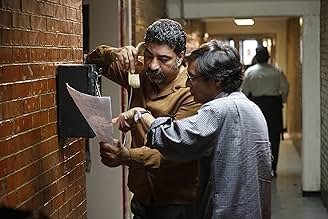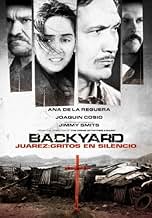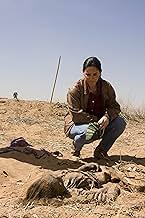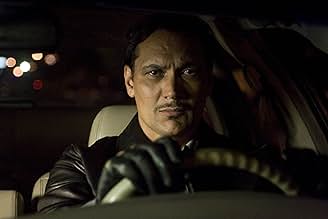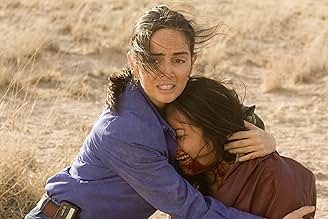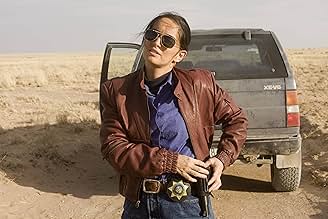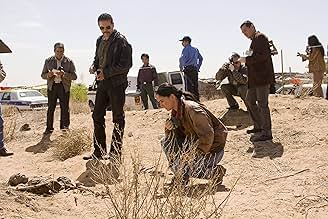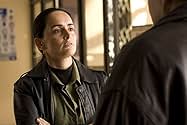El Traspatio
- 2009
- 2 घं 2 मि
IMDb रेटिंग
6.9/10
1.6 हज़ार
आपकी रेटिंग
अपनी भाषा में प्लॉट जोड़ेंThe true story of the border town of Juarez, Mexico where since the mid-1990s thousands of women have gone missing or turned up as sun-burnt corpses in the desert. Can new police captain Bla... सभी पढ़ेंThe true story of the border town of Juarez, Mexico where since the mid-1990s thousands of women have gone missing or turned up as sun-burnt corpses in the desert. Can new police captain Blanca Bravo stop the savagery?The true story of the border town of Juarez, Mexico where since the mid-1990s thousands of women have gone missing or turned up as sun-burnt corpses in the desert. Can new police captain Blanca Bravo stop the savagery?
- पुरस्कार
- 9 जीत और कुल 5 नामांकन
फ़ीचर्ड समीक्षाएं
One reviewer wrote that this movie is set in the "small" Mexican town of Ciudad Juarez, bordering the United States. Actually, Ciudad Juarez has approximately 1.3 million residents. While not the size of New York City or Los Angeles by any means, "small" town is hardly an appropriate description. FYI, Ciudad Juarez is only separated from El Paso, TX and a short stretch of Sunland Park/Anapra, NM by a narrow river, the Rio Grande (or Rio Bravo, as it is commonly known on the Mexican side). If seen from overhead it looks like one city. Many parts of Juarez are modern, Westernized-metro areas with shopping centers, U.S. fast-food chains, and an international airport. Together, the El Paso-Ciudad Juarez metropolitan area is populated by approximately 2.5 million people.
However, from Interstate 10 on the West Side of El Paso which parallels the river, the differences between the cities are quite evident. A typical U.S. metropolitan infrastructure can be seen on this side of the river, while shanty towns made of pallets and corrugated metal roofs can be seen on the other side. The sight is profound, sad, and all too real. When one grows up in an environment like that, one tends to have a different perspective of the U.S. and what "first world" really means. Most U.S. citizens don't ever confront those issues first hand, on a regular basis. We Southern Border Folk are exposed, directly or indirectly to a poverty that is severe, harsh, and very different from what U.S. poverty is typically known to be.
That severe poverty crosses over into the more rural border regions of the U.S. which are classified by the U.S. government as "Colonias", which are areas of the U.S. without the typical U.S. infrastructure that most U.S. Citizens take for granted (like electricity, natural gas, or running water). When you live in these regions, raised in them, compassion to those dealing with and escaping from this poverty becomes a part of you. Physical and geographical distance from that reality makes the heart less compassionate and the brain less understanding. That's why i believe most of us U.S. citizens tend to think politically before thinking humanely when involving border issues. We're mainly exposed to the "third world" through television; not driving to work, or shopping for groceries, or going to school.
Now there is undoubtedly extreme poverty scattered throughout the United States. Many citizens of Native-American communities and reservations live far below the U.S. poverty level. Pockets of what can be considered "third world" poverty exist especially in various regions of the South and in Appalachia, for example. These are areas like the "Colonias" where infrastructure is not systematic, but self-sufficiently innovated and "out-of-code", "off-the-grid", and not in that cool, tech-savvy, environmentally-progressive way. The difference between those areas and the "Colonias", besides the general ethnic background of the people (the aforementioned areas tend to be primarily White-Americans {or Americans of European descent}, and African-Americans) is that the "Colonias" encompass a much larger and concentrated geographical area as well as a much larger population of impoverished citizens than those scattered throughout the rest of the U.S.
These "Colonias" which exist from Texas all the way to California, and whose populations all together make up a few million, are real. The vast majority are of Mexican descent, though of course there are also smaller percentages of White-Americans, African-Americans, and Central-Americans. Many are "illegal", though most are legal citizens born and raised in the United States. "Third world" poverty exists in these regions of the U.S., make no mistake. These people constantly strive to be self sufficient. They don't expect hand outs. They don't expect government programs to save them as the politicians often describe them. But they are stuck between survival and laws and codes. Sometimes laws and codes can prevent immediate survival. The corruption between the corporate and political partnerships between the U.S. and Mexico, the laws and codes regarding construction, and land ownership and/or distribution controls their access to clean drinking water and proper waste management. As these regions therefore have a population that makes little money, the public school systems that do manage to exist there suffer greatly and can't offer education that rivals the high earning and supposedly higher tax paying metropolitan areas of our country. These complex issues keep them from being able to sustain themselves, much less plan ahead and progress.
The Capital cities of Texas, New Mexico, Arizona, and California only throw pennies towards their Southern borders. The money stays near the Capitals, where the streets are paved and the schools have college prep courses and highly educated, and the highest paid teachers. It's hard not to view some of this oppression as systematic, as planned politics in order to keep a lack of "legal" control in a region in order to aid the criminal, corrupt entities to work in the shadows, with the citizens' eyes not focused on them because their eyes are fixed on the priority of daily survival. As these citizens continue to be ignored, their voices dismissed and their plight for survival repressed, the Southern border of the U.S. will continue to crumble, through an oppression that breeds desperation that will only feed social unrest and revolution. This corruption between the two governments creates a void of leadership which is then filled by the black market; by criminal entities that create for themselves an alternative to the severe poverty of the region. Those entities become wealthy, which then become exploitative, threatening, violent, and powerful. But the key word is wealthy, the alternative to poverty, which becomes tempting to those who are most desperate. As the two governments shake hands and exchange "legal" treaties, contracts, and money, they ostracize their constituencies, they're citizens, leaving them exposed to the "illegal" elements which are only to happy to embrace them.
Peace
However, from Interstate 10 on the West Side of El Paso which parallels the river, the differences between the cities are quite evident. A typical U.S. metropolitan infrastructure can be seen on this side of the river, while shanty towns made of pallets and corrugated metal roofs can be seen on the other side. The sight is profound, sad, and all too real. When one grows up in an environment like that, one tends to have a different perspective of the U.S. and what "first world" really means. Most U.S. citizens don't ever confront those issues first hand, on a regular basis. We Southern Border Folk are exposed, directly or indirectly to a poverty that is severe, harsh, and very different from what U.S. poverty is typically known to be.
That severe poverty crosses over into the more rural border regions of the U.S. which are classified by the U.S. government as "Colonias", which are areas of the U.S. without the typical U.S. infrastructure that most U.S. Citizens take for granted (like electricity, natural gas, or running water). When you live in these regions, raised in them, compassion to those dealing with and escaping from this poverty becomes a part of you. Physical and geographical distance from that reality makes the heart less compassionate and the brain less understanding. That's why i believe most of us U.S. citizens tend to think politically before thinking humanely when involving border issues. We're mainly exposed to the "third world" through television; not driving to work, or shopping for groceries, or going to school.
Now there is undoubtedly extreme poverty scattered throughout the United States. Many citizens of Native-American communities and reservations live far below the U.S. poverty level. Pockets of what can be considered "third world" poverty exist especially in various regions of the South and in Appalachia, for example. These are areas like the "Colonias" where infrastructure is not systematic, but self-sufficiently innovated and "out-of-code", "off-the-grid", and not in that cool, tech-savvy, environmentally-progressive way. The difference between those areas and the "Colonias", besides the general ethnic background of the people (the aforementioned areas tend to be primarily White-Americans {or Americans of European descent}, and African-Americans) is that the "Colonias" encompass a much larger and concentrated geographical area as well as a much larger population of impoverished citizens than those scattered throughout the rest of the U.S.
These "Colonias" which exist from Texas all the way to California, and whose populations all together make up a few million, are real. The vast majority are of Mexican descent, though of course there are also smaller percentages of White-Americans, African-Americans, and Central-Americans. Many are "illegal", though most are legal citizens born and raised in the United States. "Third world" poverty exists in these regions of the U.S., make no mistake. These people constantly strive to be self sufficient. They don't expect hand outs. They don't expect government programs to save them as the politicians often describe them. But they are stuck between survival and laws and codes. Sometimes laws and codes can prevent immediate survival. The corruption between the corporate and political partnerships between the U.S. and Mexico, the laws and codes regarding construction, and land ownership and/or distribution controls their access to clean drinking water and proper waste management. As these regions therefore have a population that makes little money, the public school systems that do manage to exist there suffer greatly and can't offer education that rivals the high earning and supposedly higher tax paying metropolitan areas of our country. These complex issues keep them from being able to sustain themselves, much less plan ahead and progress.
The Capital cities of Texas, New Mexico, Arizona, and California only throw pennies towards their Southern borders. The money stays near the Capitals, where the streets are paved and the schools have college prep courses and highly educated, and the highest paid teachers. It's hard not to view some of this oppression as systematic, as planned politics in order to keep a lack of "legal" control in a region in order to aid the criminal, corrupt entities to work in the shadows, with the citizens' eyes not focused on them because their eyes are fixed on the priority of daily survival. As these citizens continue to be ignored, their voices dismissed and their plight for survival repressed, the Southern border of the U.S. will continue to crumble, through an oppression that breeds desperation that will only feed social unrest and revolution. This corruption between the two governments creates a void of leadership which is then filled by the black market; by criminal entities that create for themselves an alternative to the severe poverty of the region. Those entities become wealthy, which then become exploitative, threatening, violent, and powerful. But the key word is wealthy, the alternative to poverty, which becomes tempting to those who are most desperate. As the two governments shake hands and exchange "legal" treaties, contracts, and money, they ostracize their constituencies, they're citizens, leaving them exposed to the "illegal" elements which are only to happy to embrace them.
Peace
It's a fictionalized account of a long list of dead young women found in Juarez, Mexico during the 90s. They are all factory workers drawn to the new jobs. It's 1996. Police detective Blanca Bravo (Ana de la Reguera) is new and investigating the latest body found in the desert of Cuidad Juarez. The first documented case was 3 years ago and the police investigations have been incompetent. There is a lot of political and economical pressure to minimize the reality. The movie also follows Juanita who just arrived starting a new job at a factory. Bravo arrests a lowlife criminal and he calls businessman Mickey Santos (Jimmy Smits) for help. Santos is supposedly squeaky clean but he turns out to be a fellow sex offenders from El Paso. The governor is always pushing to put the case away.
I really like Ana de la Reguera. She's playing a smart cop in a world of compromises. She's carrying this movie on her shoulders. She adds another level by being a woman in a male dominated world. The setting is quite compelling. It's great to get the realistic locations. I do wish for better cinematography. However that's a small matter.
I really like Ana de la Reguera. She's playing a smart cop in a world of compromises. She's carrying this movie on her shoulders. She adds another level by being a woman in a male dominated world. The setting is quite compelling. It's great to get the realistic locations. I do wish for better cinematography. However that's a small matter.
While this was played at the Fantasy Filmfest, it is anything but. It's more documentary than fiction. And there is no fantasy to be had here. Of course it is a very well known fact that crimes are committed around the world, so does this movie offer any new insight? Depending on how much you know on that matter, it might.
And it is mostly "educactional" rather than entertaining. Trying to open our eyes to a very shameful situation happening. The question is, how much do we care or are we able and willing to change what is happening? Is it the old: "What can I do from where I am at?" or the "There is worse things happening elsewhere".
Whatever is true, the movie is harsh and down and dirty and not something that can be considered an easy watch. It's as uncomfortable as to be confronted with things like the ones I have mentioned above. If you think this review is harsh, you may wanna stay away from this movie too
And it is mostly "educactional" rather than entertaining. Trying to open our eyes to a very shameful situation happening. The question is, how much do we care or are we able and willing to change what is happening? Is it the old: "What can I do from where I am at?" or the "There is worse things happening elsewhere".
Whatever is true, the movie is harsh and down and dirty and not something that can be considered an easy watch. It's as uncomfortable as to be confronted with things like the ones I have mentioned above. If you think this review is harsh, you may wanna stay away from this movie too
Produced in 2009, 'Backyard' (the original title in Spanish is 'El traspatio') - the film by Mexican director Carlos Carrera - is no easy watch. We could include it in the category of serial killers thrillers, if the amount of murders that are brought to the screen would not push the story into the horror category and if the fact that the script is inspired by real events would not suggest that it would rather be a docu-drama. It is shocking that what is reported in 'Backyard' - the murders accompanied by sexual assault and mutilation of hundreds of young women in the city of Juarez on the border between Mexico and the United States - are events that happened in reality, and in the following decade we heard repeatedly about many more cases of violence of this kind and other crimes that take place in this part of the world. It is obvious that the filmmakers used the popular cinematographic genres to draw attention to an extreme crisis situation and a phenomenon that urgently need radical solutions. However, the situation does not seem to have improved since then.
The main thread of thstory follows the investigation led by police officer Blanca Bravo (Ana de la Reguera), sent to Juarez to investigate a series of homicides and sexual assaults that take incredible proportions. Ciudad Juarez is not only geographically close to the American city of El Paso, but it is also the landfill and the cheap entertainment place of the American metropolis. They are separated not only by a border but also by an economic and social chasm. Corruption reigns in the police, politicians and industrialists who use cheap labor for various industries, including Japanese-branded cars. Most factories employ young women from all over Mexico (probably even lower paid) and they are the ones who are at risk of becoming victims of crime. The secondary story - which takes place in parallel - follows path of such a girl - Juana Sanchez Asur Zagada) - who came from a remote village to earn a living.
'Backyard' is well made and the only thing I would be critic about is the fact that it follows the rules of action movies too rigorously. Blanca is one of those characters who belongs to the category of the incorruptible and the fearless and the interpretation of Ana de la Reguera makes the role credible. Asur Zagada is also excellent in the role of the young Juana and so is Carolina Politi in a memorable supporting role. It is a feminist film and Carlos Carrera's directorial treatment helps us sympathise with the characters. The shocking scene that opens the film and the ending that puts the events in the historical context are strong and in fact there that the directors probably intended to express the message of the film. What happens between the opening and the end is a quality horror thriller, but a bit long and a bit predictable one. I do recommend 'Backyard' for the quality of the production and the importance of the message.
The main thread of thstory follows the investigation led by police officer Blanca Bravo (Ana de la Reguera), sent to Juarez to investigate a series of homicides and sexual assaults that take incredible proportions. Ciudad Juarez is not only geographically close to the American city of El Paso, but it is also the landfill and the cheap entertainment place of the American metropolis. They are separated not only by a border but also by an economic and social chasm. Corruption reigns in the police, politicians and industrialists who use cheap labor for various industries, including Japanese-branded cars. Most factories employ young women from all over Mexico (probably even lower paid) and they are the ones who are at risk of becoming victims of crime. The secondary story - which takes place in parallel - follows path of such a girl - Juana Sanchez Asur Zagada) - who came from a remote village to earn a living.
'Backyard' is well made and the only thing I would be critic about is the fact that it follows the rules of action movies too rigorously. Blanca is one of those characters who belongs to the category of the incorruptible and the fearless and the interpretation of Ana de la Reguera makes the role credible. Asur Zagada is also excellent in the role of the young Juana and so is Carolina Politi in a memorable supporting role. It is a feminist film and Carlos Carrera's directorial treatment helps us sympathise with the characters. The shocking scene that opens the film and the ending that puts the events in the historical context are strong and in fact there that the directors probably intended to express the message of the film. What happens between the opening and the end is a quality horror thriller, but a bit long and a bit predictable one. I do recommend 'Backyard' for the quality of the production and the importance of the message.
BACKYARD is a gritty Mexican thriller that explores the plight of young women in the city of Ciudad Juarez. It's a film in which the rape and murder of these innocent figures plays a large part and thus it's largely unpalatable viewing, and yet as the whole thing is based on fact it's also extremely shocking.
Having experienced a few of these Mexican movies like the similar HELI I'm afraid to say that I'm not really a fan of them. I appreciate that the stories need to be told but I would much rather watch a documentary than a fictionalised version. BACKYARD is a hodge podge of all too familiar themes involving the drug trade, the problems faced by the police force seeking to bring those responsible to justice, corruption, exploitation, and of course human trafficking.
The story is rather overlong and does feel unfocused in places. It's never exciting or suspenseful, just rather depressing. Old-timer Jimmy Smits plays a local businessman and is cast well against type, giving a solid performance, but the rest of the cast seemed to me to be playing rather tired and predictable roles.
Having experienced a few of these Mexican movies like the similar HELI I'm afraid to say that I'm not really a fan of them. I appreciate that the stories need to be told but I would much rather watch a documentary than a fictionalised version. BACKYARD is a hodge podge of all too familiar themes involving the drug trade, the problems faced by the police force seeking to bring those responsible to justice, corruption, exploitation, and of course human trafficking.
The story is rather overlong and does feel unfocused in places. It's never exciting or suspenseful, just rather depressing. Old-timer Jimmy Smits plays a local businessman and is cast well against type, giving a solid performance, but the rest of the cast seemed to me to be playing rather tired and predictable roles.
क्या आपको पता है
- ट्रिवियाA newspaper from Torreón, México reported that the cast and crew were followed, and to some degree bullied, by people while shooting on location in Ciudad Juárez, México. They even reported the robbery of equipment.
- गूफ़In the scenes located in Juarez Avenue, it can be seen "transborde" buses and a big led screen with publicity. Those were activated in late 2006. (The story occurs on 1996)
टॉप पसंद
रेटिंग देने के लिए साइन-इन करें और वैयक्तिकृत सुझावों के लिए वॉचलिस्ट करें
- How long is Backyard?Alexa द्वारा संचालित
विवरण
बॉक्स ऑफ़िस
- दुनिया भर में सकल
- $8,22,960
- चलने की अवधि
- 2 घं 2 मि(122 min)
- रंग
- ध्वनि मिश्रण
- पक्ष अनुपात
- 2.35 : 1
इस पेज में योगदान दें
किसी बदलाव का सुझाव दें या अनुपलब्ध कॉन्टेंट जोड़ें

